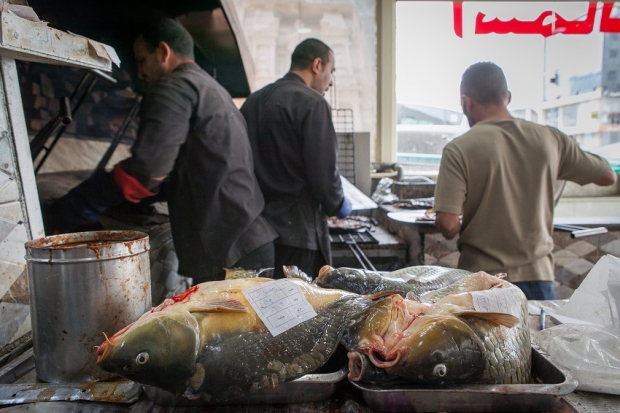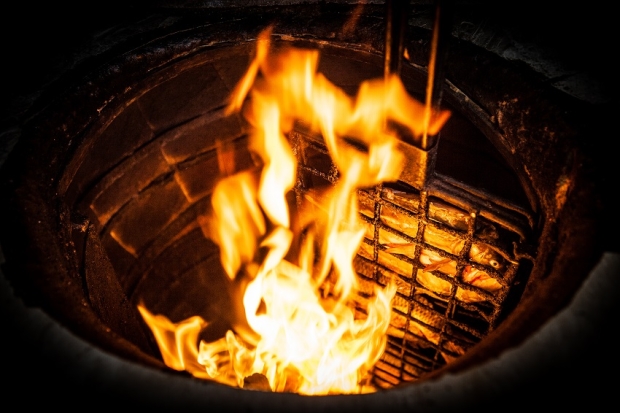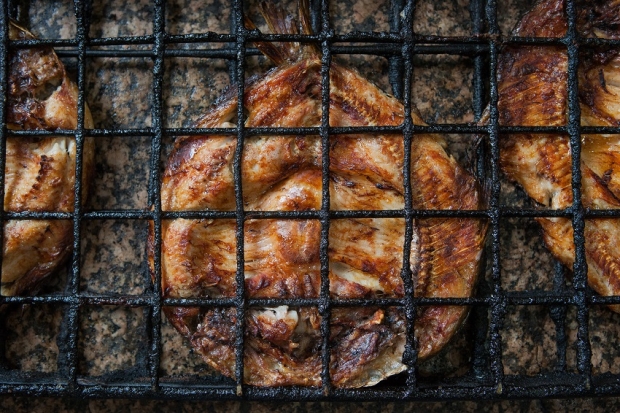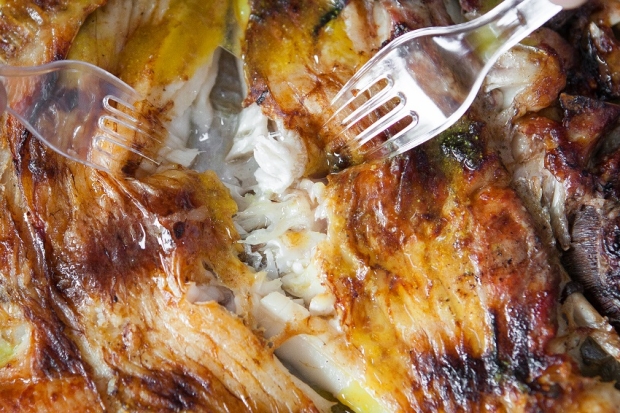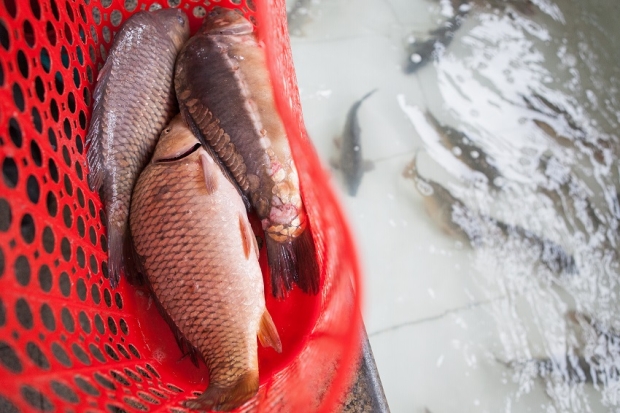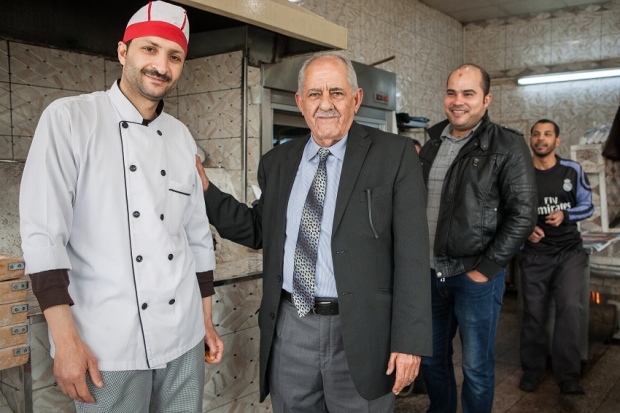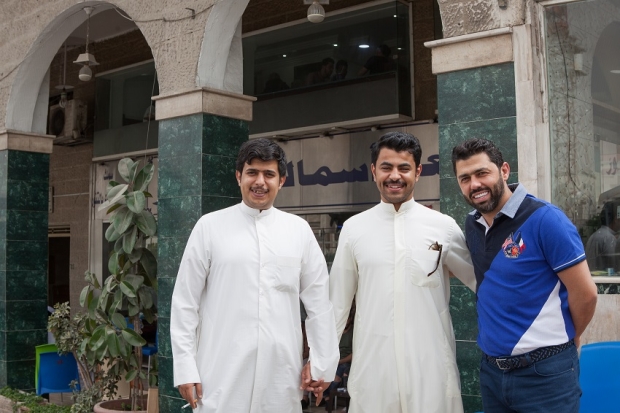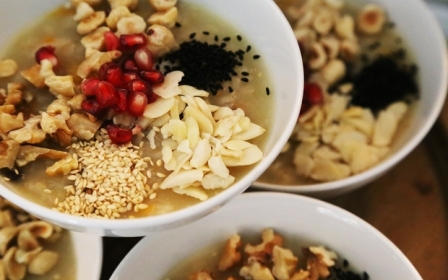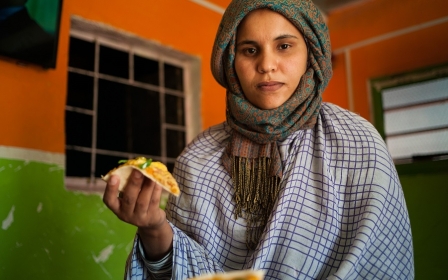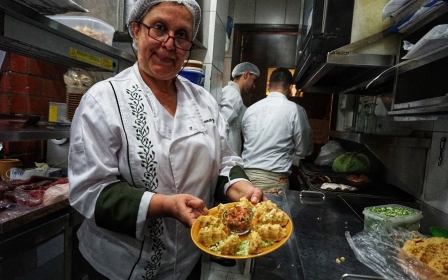Mad for masgouf: 'Once they've tried it, they can't live without it'

AMMAN, Jordan - Along the bustling Wasfi al-Tal street stands Al-Mahar Fish Restaurant, a household name in the north-western area of Amman. Tucked behind green pillars, the restaurant’s large bay windows reveal about 30 dark wooden tables and coloured tapestry seats.
Inside the place is always swarming with visitors. It is 1pm and a group of customers are selecting fish for their meal. Usually the choice depends on the weight of the fish.
In the kitchen, Mikha stands proudly in his grey suit next to a fish tank filled with about 50 carp.
“The water should be between 10 to 35 degrees. If it is less, the fish will fall into a coma, if it's more, they will die,” he warns.
Having established his restaurant in Amman in 2005, Mikha is now regarded by many of his customers as the king of masgouf – the only item on Al-Mahar Fish Restaurant's menu and often considered the national dish of Iraq.
Mikha runs a tight ship at Al-Mahar, managing a staff of 30 including from Jordan and Egypt. Iraqi cooks explain to their counterparts of other nationalities the significance of dish in Iraq's culinary culture before teaching them how to roast it over flames.
“The Iraqis taught the others [the] masgouf secret recipe,” the owner explains.
You want a fish? You kill it
In the large kitchen, a one-kilo carp is taken out of the fish tank by one of the staff.
'This is absolutely delicious. The taste of the fish blends perfectly with the acidity of the pickles and the sweetness of the sauce'
- Saleh Buhmiza, customer
Tradition dictates that the fish are killed by the customer with a quick blow to the head using a wooden mallet. The fish is then gutted, its skin laced with salt and mounted on an iron spike, ready to be roasted.
If the carp is carrying eggs, they are removed and then fried with tomatoes and onions to be served as a side dish.
An employee at the restaurant shows off a bottle containing a sauce dubbed “Abu Haytham’s magic mix”. It is a special sauce made of sumac, vinegar and tomato paste that is generously spread on the entrails of the fish.
'Mikha used to cook the best carp in Iraq, now he cooks the best in Jordan'
- Kasim Haddad, Iraqi customer
After 30 minutes of cooking, the masgouf is ready to be served with pickles, lemon and olives. There is also mango chutney with amba and tannour bread, which is shaped by hand and then placed on the sides of a hot cylindrical oven made from clay or mud.
"This is absolutely delicious," says Saleh Buhmiza, a 35-year-old customer. "The taste of the fish blends perfectly with the acidity of the pickles and the sweetness of the sauce."
Next to him, Mubarak Allah, another customer, carefully removes the bones before squeezing the lemon on his plate.
Fish farming
No one could have predicted that Mikha would become a masgouf master. Born in Mosul in 1945, he began his career as a high-school physics teacher in Baghdad in 1968. To supplement his income, he also worked as a hotel manager.
In 1984, friends of his proposed that he work with them in the fish business. At that time, many fish farms were created to compensate for the drying up of Mesopotamian marshes under Saddam Hussein. Mikha agreed to focus on fish farming with his friends and gave up his other jobs (his restaurant now sources its fish from a farm in the Jordan Valley).
In the beginning, fish farming was met with some resistance from Iraqis who argued that fish used to cook masgouf had to come directly from the Tigris and Euphrates rivers, which flow through Iraq.
But towards the end of Saddam's rule, the draining of Iraq’s southern marshes and the damming of the country's rivers led to a dramatic decline in fish caught off Iraq’s coast, according to the UN Food and Agriculture Organisation (FAO).
Fish farming began to boom. In 1984, Iraq's annual common carp production through aquaculture was 4,476 tonnes, whereas in 2016, production was nearly 29,000 tonnes, according to the FAO.
“Those fortunate enough to enjoy a twilight stroll along the outdoor restaurants lining the banks of the Tigris river will be tempted by the many eateries serving this fish dish,” wrote the Iraqi chef Raghad al-Safi in her book The Iraqi Table.
But, according to Mikha, this technique was flawed. “Carp took too long to cook, attracted pollution from the streets and were not roasted evenly,” he says.
'I have instilled the masgouf tradition into their culinary culture'
- Abu Haytham Mikha, restaurateur
To tackle this issue, Mikha opened his first restaurant in Baghdad in 1985, which was also named Al-Mahar Fish Restaurant. As a physics professor, he used thermo-physics to create the perfect oven for roasting masgouf: a hole in an inclined plane designed to accommodate the grates containing the carp; a space to burn the wood; and an air inlet to continuously supply the fire with oxygen.
A large tank, which is placed on a wood fire, accommodates metal grates which hold the carp in place while being cooked. To give the fish a unique taste, some of the smoke is released into the tank through a small hole.
Mikha claims that his oven cooks fish evenly in only 30 minutes. “My friends used to say that people haven't really been to Baghdad if they haven’t tried my fish," he says, smiling.
When war came
In 2003, the US-led invasion of Iraq sparked waves of sectarian violence. Mikha, a Christian, was one of the hundreds of thousands who fled. Once Iraq was home around 1.4 million Christians; now it is 350,000 at most.
"The Americans brought anxiety to Iraq," he recalls. "As Christians, we were persecuted. It was tough for the minorities."
Now Iraqis constitute the second-largest refugee population in Jordan after Syrians, with more than 63,000 Iraqis resident.
The Americans brought anxiety to Iraq. As Christians, we were persecuted. It was tough for the minorities
- Abu Haytham Mikha, restaurateur
“To obtain a residence permit in the Hashemite kingdom, exiled Iraqis only had three options: either deposit money in the bank ($20,000 for a family), or own an apartment in the country, or start a business,” says Zachary Sheldon, a PhD candidate in anthropology at the University of Chicago, who is conducting research into Iraqi residents of Amman.
Now Mikha's restaurant in Amman sells between 500 and 1,000 kilos of fish per day, at nine Jordanian dinars ($12.69) per kilo.
“Once they've tried it, they can't live without it," he reflects. "In a way, I have instilled the masgouf tradition into their culinary culture."
But perhaps the best accolade comes from fellow Iraqis in the Jordanian capital. "Mikha used to cook the best carp in Iraq," says Kasim Haddad, an Iraqi regular who is currently visiting Amman. "Now he cooks the best in Jordan."
New MEE newsletter: Jerusalem Dispatch
Sign up to get the latest insights and analysis on Israel-Palestine, alongside Turkey Unpacked and other MEE newsletters
Middle East Eye delivers independent and unrivalled coverage and analysis of the Middle East, North Africa and beyond. To learn more about republishing this content and the associated fees, please fill out this form. More about MEE can be found here.


